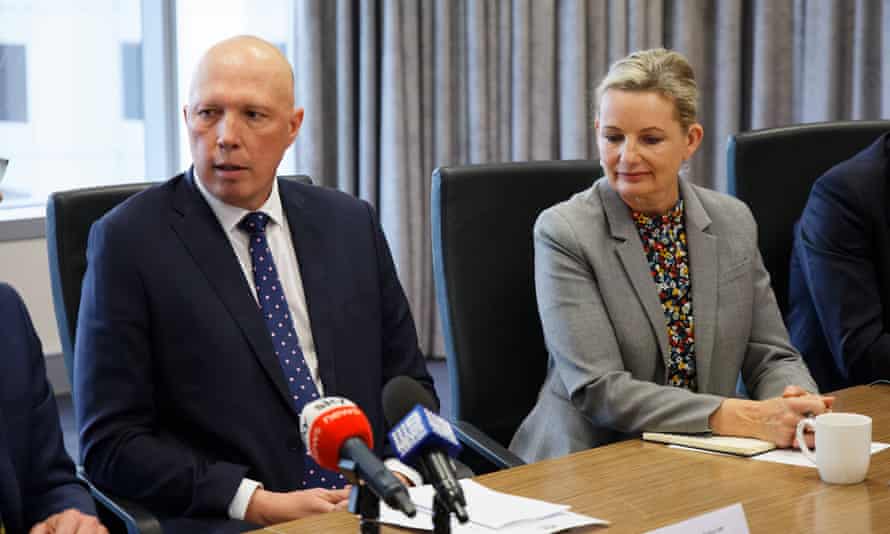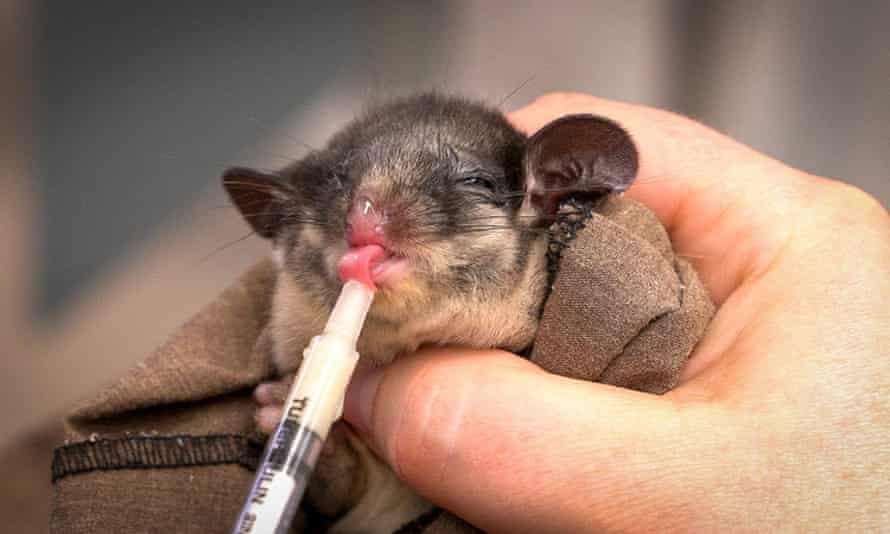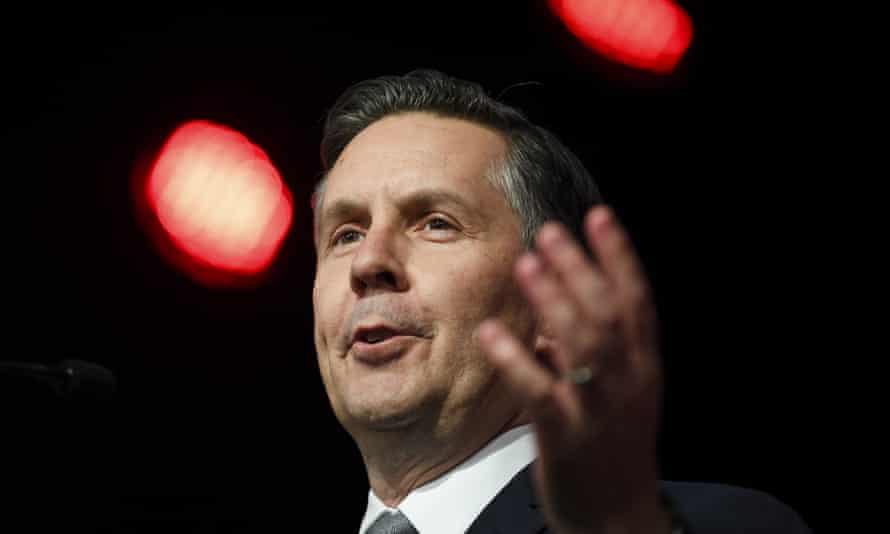
Mark Butler says Covid vaccines for children under five coming within months
Health minister, Mark Butler, is making the rounds this morning, and said on RN Breakfast that Covid vaccines for children under five years old could be approved “within months”.
Butler said the Therapeutic Goods Administration has an application from Moderna they are currently considering, and that it could be a couple of months before they are rolled out:
The Therapeutic Goods Administration has an application from Moderna which they’re currently going through. If that is approved, then that will go to our advisory group on vaccinations.
I don’t control that timeframe. I think it’s appropriate that those authorities feel that they are able to conduct their legislative work in a timeframe that’s proper, and I’d expect that to happen over the coming weeks now.
The former chair of the advisory group on vaccines [Prof Allen Cheng] I know said over the last couple of days it might be a month or two until we finally see those vaccines going into the arms of under-five-year-olds, but that ultimately is a matter for them.
Lowe says Australians should prepare for higher interest rates
Reserve Bank governor, Philip Lowe, has continued addressing the American Chamber of Commerce this morning. He says Australians should prepare for higher interest rates.
Adding to his comments about doing whatever was necessary to address inflation, Lowe warned that interest rates were still “very low” for an economy facing such high inflation and low unemployment:
As we chart our way back to 2 to 3% inflation, Australians should be prepared for more interest rate increases.
We decided to make a bigger 50 basis-point adjustment on the basis of the additional information suggesting a further upward revision to an already high inflation forecast.
The board also gave consideration to the fact that the level of interest rates was still very low.
I want to emphasise though that we are not on a preset path.
How fast we increase interest rates, and how far we need to go, will be guided by the incoming data and the board’s assessment of the outlook for inflation and the labour market.
Lowe says RBA will do ‘what is necessary’ to stop inflation
Reserve Bank governor, Philip Lowe, is speaking at an American Chamber of Commerce event in Sydney, and has pledged to avoid the mistakes of the 1970’s stagflation period, saying the RBA will do “what is necessary” to ensure inflation remains low.
Lowe admitted that global events had been influencing the rising rates of inflation, but added that, increasingly, domestic factors were coming into play:
Following the strong recovery from the pandemic, growth in domestic spending is now testing the ability of the economy to meet the demand for goods and services.
This is particularly evident in the labour market, with many firms reporting that the availability of labour is a significant constraint on their ability to operate and/or expand.
High inflation damages the economy, reduces the purchasing power of people’s incomes and devalues people’s savings.
It is also regressive, hurting most those who are least well equipped to protect themselves.
so we’ve got the final makeup of the Senate
Labor: 26
Coalition: 32
Greens: 12
JLN: 2
One Nation: 2
UAP: 1
David PocockLabor will need all 12 Greens, plus at least 1 crossbencher, to get a 39-vote majority
— Josh Butler (@JoshButler) June 20, 2022
2022 Senate election:
Labor 15 seats, Coalition 15, Greens 6, crossbench 4 (Roberts, Tyrrell, Pocock, Babet)2019 election (continuing senators):
Labor 11, Coalition 17, Greens 6, crossbench 2 (Roberts, Lambie)— Josh Butler (@JoshButler) June 20, 2022

Ben Butler
Australia likely to impose more sanctions on Russia, Dfat official says
More sanctions against Russian people and companies over the invasion of Ukraine are likely, a senior foreign affairs department official says.
“It wouldn’t be unsafe to bet some money on further sanctions in relation to Russia,” Andrew Walter, a first assistant secretary at Dfat, said. “Beyond that, I don’t intend to speculate.”
Speaking on Monday at a conference in Sydney organised by ACAMS, a global organisation of anti-financial crime professionals, Walter also said that the department was working to deal with complaints by banks and other financial intermediaries that the sanctions system was too complicated.
Walter said Australia’s sanctions had revealed that there was a large amount of interaction between Russia and Australia, despite the relatively shallow economic links between the two countries.
“That’s because Australians are operating all over the world and Russians are operating all over the world,” he said.
During the conference, bankers said they have had to dramatically increase their sanctions compliance divisions, and complained that the complexity of the Australian sanctions regime can make complying with it difficult.
“I can’t see work around that complexity of implementation of existing sanctions abating in the short term,” Walter said.
“I think that’s going to be a big feature and it’s very important we step back from that a little bit and grab what lessons we can, and see whether there’s appropriate reforms to address some of those kind of frictional points in there.”
Sri Lankan navy says it cannot prevent boats from leaving
The Sri Lankan navy has declared that it cannot stop a surge of boats leaving for Australia, as hundreds try to flee the country’s economic meltdown.
Speaking to the Age, Sri Lankan navy spokesman Captain Indika De Silva said the navy would struggle to cover the island’s 1,340km coastline, and that some smugglers were trying to use the new political landscape in Australia “to their advantage”:
Sometimes there have been boats that have slipped through.
It’s not because we don’t have the resources. It’s the way they operate – the smugglers – it is their primary task to evade the navy mechanisms.
So far we have been able to carry our duties at an appropriate level to counter the threats emanating from the maritime domain including those illicit migration attempts.
Good morning Australia! It’s the penultimate day for declarations for the 2022 Federal Election. Today we have (local times listed):
NSW
🗳️ Berowra: 9am
🗳️ Page: 10am
🗳️ Hume: 11:30am
🗳️ Richmond: 3pmVic
🗳️ Corio: 10am
🗳️ Mallee: 10am
🗳️ Melbourne: 10amBUT WAIT THERE’S MORE
— AEC ✏️ (@AusElectoralCom) June 20, 2022
More declarations, you say?
Tas
🗳️ Bass: 10am
🗳️ Lyons: 11amQLD
🗳️ Wide Bay: 10am
🗳️ Herbert: 12:30pmWA
🗳️ Durack: 2pm
🗳️ O’Connor: 3pm— AEC ✏️ (@AusElectoralCom) June 20, 2022
Peter Dutton says Coalition won’t budge on its climate policy
Opposition leader, Peter Dutton, has taken to 2GB radio this morning to declare his party would not be changing its climate policy because “millions of Australians voted for us on that basis”.
Ignoring the electoral thumping the Coalition took at the election, and the swirling discussions around whether the result should mean change for the opposition, Dutton said the party room would also consider any “new information” if presented with it:
We took our policy to the election and millions of Australians voted for us on that basis. That’s the position that we’ll take forward.
Over time, if you’ve got new information before you and a new proposition, well, that can be considered by the party room.
This, by the way, comes as a moderate Liberal MP, who has chosen to remain anonymous, told the Financial Review they would take issue with Dutton opposing Labor’s emissions legislation, particularly because of the election result:
There was some consternation that there hasn’t been a proper discussion given those who face obvious pressures in their seats on this issue.

NSW records seven Covid deaths and 7,805 new cases
NSW Health is reporting 7,805 new Covid cases and seven deaths:
COVID-19 update – Tuesday 21 June 2022
In the 24-hour reporting period to 4pm yesterday:
– 96.5% of people aged 16+ have had one dose of a COVID-19 vaccine
– 95.1% of people aged 16+ have had two doses of a COVID-19 vaccine pic.twitter.com/f25smPwmXq— NSW Health (@NSWHealth) June 20, 2022
Victoria records 28 Covid deaths and 7,507 new cases
Victoria is reporting a spike in Covid related deaths, after 28 people lost their lives overnight:
Rally outside NSW parliament to protest government’s wages policy
The AAP is reporting that NSW private and public sector union members are rallying outside parliament to protest against the government’s wages policy, saying it will leave workers worse off as inflation takes flight.
The rally coincides with the treasurer, Matt Kean, preparing to deliver the Perrottet government’s first budget at midday on Tuesday.
Dominic Perrottet has already flagged that public sector workers can expect a 3% wage rise in the budget this year.
Unions NSW secretary, Mark Morey, says with inflation running at 5.2%, and predictions it could hit 7% by the end of the year, the government’s pay offer will slash workers’ real wages by thousands of dollars a year. He told Sydney radio 2GB:
We are losing skilled teachers, nurses, cleaners – and we’re going to have more pressure in NSW for services to be provided that we can’t retain.
It’s not much to ask and the government needs to act.
Mark Butler says Covid vaccines for children under five coming within months
Health minister, Mark Butler, is making the rounds this morning, and said on RN Breakfast that Covid vaccines for children under five years old could be approved “within months”.
Butler said the Therapeutic Goods Administration has an application from Moderna they are currently considering, and that it could be a couple of months before they are rolled out:
The Therapeutic Goods Administration has an application from Moderna which they’re currently going through. If that is approved, then that will go to our advisory group on vaccinations.
I don’t control that timeframe. I think it’s appropriate that those authorities feel that they are able to conduct their legislative work in a timeframe that’s proper, and I’d expect that to happen over the coming weeks now.
The former chair of the advisory group on vaccines [Prof Allen Cheng] I know said over the last couple of days it might be a month or two until we finally see those vaccines going into the arms of under-five-year-olds, but that ultimately is a matter for them.
Shorten says Greens moving Australian flag ‘counterproductive’
Minister for government services, Bill Shorten, has criticised the Greens for removing the Australian flag from view before a press conference yesterday.
A staffer moved the flag out of shot of TV cameras, and Shorten was not impressed, telling the Today show the act was “counterproductive to the cause”.
I would remind Adam and the Greens … that we’ve got to bring people with us on a path of change.
Everyone agrees that our First Nations people should get an equal deal in this country. We want to change the constitution and include them in our nation’s birth certificate, but antics like this … This is virtue signalling.
Virtue signalling is when someone thinks that their morality is superior to everyone else’s.

Benita Kolovos
Endangered leadbeater’s possum born in captivity for first time in two decades
Victoria’s faunal emblem – the critically endangered leadbeater’s possum – has been born in captivity for the first time in 20 years.
Environment minister, Lily D’Ambrosio, on Tuesday announced the arrival of two highland leadbeater’s possum joeys born at Healesville Sanctuary. The duo have undergone health checks and have been confirmed to be female.

She says the births provide hope for the long-term goal of also successfully breeding lowland leadbeater’s possums, of which fewer than 30 remain in the world.
Comparatively, highland populations have declined to a few thousand possums.
The breeding breakthrough has been attributed to a new diet of honey-based nectar, loaded with increased fibre, vitamins and minerals, which has led to positive changes to the possums’ gut microbiome and reproductive health.
The government has contributed almost $4m since 2018 to improving the long-term sustainability of the possum and the helmeted honeyeater, the state’s two faunal emblems.
D’Ambrosio said:
We’re excited to welcome these two precious possums and to see the success of our ongoing investment into our state’s faunal emblem and the unique biodiversity of Victoria.
Chalmers says Labor has inherited a budget with ‘significant challenges’
The treasurer, Jim Chalmers, who is due to hand down his first budget on 25 October, has spoken to the Nine newspapers, saying the government’s bottom line is being affected by higher-than-expected interest rates on outstanding debt.
As interest rates on government debt rise to their highest levels in eight years, amid rising global inflation, could combine to derail any plans to bring the budget under control.
Chalmers laid the blame firmly on the previous government, saying the “legacy” of the Coalition government was a trillion dollars in debt with “not enough to show for it”.
After a wasted decade, the Liberals’ legacy is a trillion dollars of debt with not enough to show for it and now the cost of servicing all that Liberal debt is going up too.
We’ve been upfront about the significant challenges in the economy and the additional pressures on the budget we’ve inherited, including the cost of rising bond yields.
Fletcher says Labor government a ‘parliamentary go-slow’
The proposed parliamentary sitting schedule for the rest of the year was released last night, and the opposition was quick to criticise the government for its “remarkably light” schedule.
Almost as soon as the schedule was released, opposition spokesman for business in the house, Paul Fletcher, released a statement criticising it for being too short.
This, of course, comes after the Coalition had designed a schedule with just 10 sitting days before August 2022.
Dan Tehan says Labor has given “no good reason” why parliament isn’t sitting until July.
In government, the Coalition designed a schedule with just 10 sitting days before August 2022.
Parliament, optional in govt, VITAL in opposition.#auspoI https://t.co/NiqSxwRwIF
— Paul Karp (@Paul_Karp) June 13, 2022
Nonetheless, here is what Fletcher had to say:
The Albanese Labor government is on a parliamentary go-slow.
Total sitting days for the House of Representatives for 2022 will be just 40. This is a dramatic drop from 67 in 2021 and 58 in 2020.
The latest day for return of the writs is 28 June and Labor is just scraping in within the 30 day period by reconvening Parliament on 26 July.
This is entirely at odds with Labor’s claim that they do not waste a day.
Richard Marles arrives in India
Deputy prime minister and defence minister, Richard Marles, arrived in India earlier this morning for his scheduled trip, where he will meet his Indian counterpart, Rajnath Singh.
Marles’ trip is intended to engage a “top-tier partner”, to discuss defensive cooperation and ambitions for an “open, inclusive and resilient Indo-Pacific”.
Arrived in India – a top-tier partner + close friend to Australia.
I look forward to advancing our ongoing defence engagement as Comprehensive Strategic Partners and reiterate our commitment for closer cooperation in the #IndoPacific. pic.twitter.com/68bxyCkxyf
— Richard Marles (@RichardMarlesMP) June 20, 2022
Federal health minister says long Covid a ‘major health challenge’
The federal health minister, Mark Butler, has begun the daily round of politicians in the media this morning, appearing on Sunrise and warning that there could be “very big” numbers of Australians suffering from long Covid.
Butler said the large Omicron wave may have contributed to the rising rates of long Covid, adding it was proving to be a “major health challenge”:
When you get the sort of numbers of Covid that we have had here in Australia – literally millions and millions of Australians – that is going to translate into very big numbers of people experiencing long Covid symptoms.
I am very keen to talk with clinicians, researchers, have a look at the international research as well, and start to make sure our health system is prepared for what will be a very big wave of people experiencing these very long symptoms.
We are seeing dozens and dozens of deaths every week. This is still a very serious health challenge which we cannot take lightly.

Good morning
Good morning, Mostafa Rachwani with you this morning. I’ll be taking you through what I’m sure will be another busy day.
We begin with the Australian Competition and Consumer Commission, who will conduct an investigation into energy prices, including an assessment of power companies and whether they are gaming the system for profit. Commission chair, Gina Cass-Gottlieb, told the Nine newspapers the ACCC had “real breadth of powers” to investigate companies’ behaviour.
It comes as former chair Rod Sims pens an opinion piece for Guardian Australia today, saying the government should push against “the instincts of the corporate sector” and introduce more competition into the market. Sims argues there is inadequate competition in Australia, and that the government should be the one to foster greater competition.
There are two state budgets due today, from the New South Wales and Queensland state governments. The NSW government has already flagged a wide range of measures, including a $5.8bn investment into an extra year of education and $4.5bn boost to the health sector.
The Palaszczuk government’s eighth budget will also be handed down today, and expectations will be that the focus will be on health and cost of living measures, including a $175 electricity rebate expected to be introduced.


